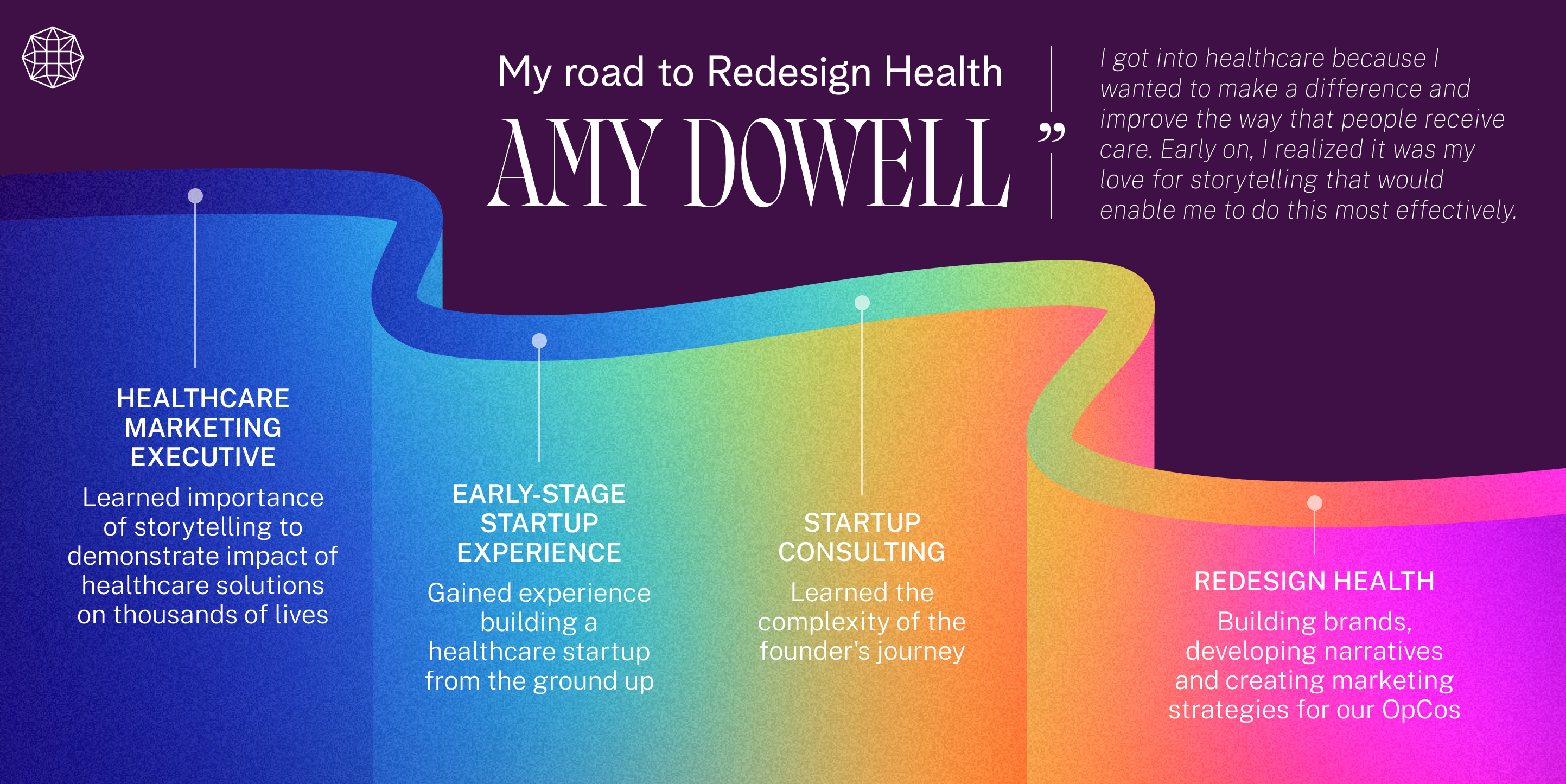
Missy Krasner: Aligning Incentives to Accelerate Change
We recently spoke with Redesign Health Venture Chair, Missy Krasner, to share her experience building next-generation healthcare solutions at scale. The Redesign team is growing. Come join us!
I’ve always enjoyed working on entrepreneurial teams rooted in a commitment to innovation – it’s what drew me to several large technology companies like Amazon, Box, and Google. I worked inside their intrapreneurial healthcare divisions.
Healthcare is a unique and opaque industry, and it’s difficult for large tech companies to break in – even those with a reputation for “build fast and iterate often” or “think big” mentalities. I was involved with two major healthcare initiatives in big tech – one at Google (Google Health) and two at Amazon (Amazon Care and Alexa Health & Wellness, respectively).
I spent significant time educating Senior leadership on healthcare’s regulatory and business challenges while at Google and Amazon. I also found the need for this type of education when I worked in traditional Venture Capital as well, particularly with Managing Partners who specialized in enterprise technology or life sciences. In these scenarios, either at Google, Amazon or in Venture Capital, healthcare was always a parenthesis -- a new segment to expand into but not a core business. As a result, I never had the opportunity to work with everyday healthcare operators who were 100% committed to improving healthcare. In large part, I found myself drawn to Redesign Health for this reason. I wanted to work at a company exclusively focused on redesigning healthcare, which offered ideation at the top of the value chain but also had a role in seeding, launching, and funding companies from their inception. This type of innovation platform allows me to flex both my past operator and investor experience and gives me the opportunity to have a more profound role in influencing founding team construction and finding rapid product-market fit.
With the ideation and launch of Redesign Health’s Operating Companies, I experience company creation at every stage, from the first spark of an idea to researching buyer profiles to building an MVP. As a Venture Chair, I have the privilege of hiring talented CEOs and helping guide them on their startup journey — whether that means growing and moving the company into adjacent markets or even sometimes rapidly pivoting their business models when necessary. This job covers every stage of getting newcos started and quickly learning what does or does not align with our original thesis.
Here are my three favorite things about Redesign Health:

"If we align the various stakeholders in healthcare and start chipping away at all the perverse industry incentives, new and exciting business models will arise. This space is where Redesign Health has the most expertise and the most success."
1. Redesign Health's focus on business model innovation.
This focus was evident from the start. There are two ways you can move the needle in healthcare. One is with unique IP, which usually takes the form of a new diagnostic or medical device. Traditional venture capital firms and big tech companies spend a substantial amount of time looking for defensible IP. However, building out a unique technology with multiple patents does not always result in a significant uptick in healthcare industry adoption, as new technologies require new reimbursement codes. Healthcare is also a high-touch industry, so clinicians and administrative staff are very sensitive to disintermediation. As a result, there are many challenges to getting to mainstream adoption, even with strong, defensible IP.
Another way to push forward in healthcare is with business model innovation, where I believe the industry should spend most of its time and energy. If we align the various stakeholders in healthcare (like health insurance companies, self-insured employers, providers, labs, pharma manufacturers, retail pharmacies, and patients) and start chipping away at all the perverse industry incentives, new and exciting business models will arise. This space is where Redesign Health has the most expertise and the most success.
Take, for example, UpLift– a new behavioral healthcare delivery system built for the present and future of value-based care. UpLift uses technology to deliver comprehensive, affordable, science-based psychotherapy, psychiatry, and collaborative care through partnerships with leading health insurers and health systems. UpLift unites the needs of three industry stakeholders all on one platform: 1) it works with insurers to aggregate therapists and psychiatrists into their networks where coverage is needed; 2) it helps patients find and access high-quality, affordable behavioral healthcare that is in-network and reimbursed by their insurance plans; and 3) it empowers providers to practice independently by growing their personal income, tapping into the majority of patients seeking behavioral healthcare who need to use their health insurance because they cannot afford cash pay prices. UpLift also enables therapists to collaborate with psychiatrists to deliver better, more comprehensive care.
2. A diverse environment poised for innovation.
I have the privilege of working with very successful, well-known healthcare operators and other leaders outside the healthcare industry. On the healthcare side, my colleagues are former C-suite executives from national payor organizations and trailblazers in telehealth, value-based care, fertility and IVF, and healthcare system delivery. I am also surrounded by diverse thinkers specializing in DTC performance growth marketing, e-commerce, retail, real estate & four-wall businesses, wellness, and nutraceuticals. The amalgam of these diverse backgrounds raises the bar for the performance and growth of our operating companies at Redesign Health. While the healthcare industry is hyper-focused on creating quality outcomes, marketing is often less of a focus, especially to patients and providers, thus, the sprint to unlock patient and provider engagement. Having individuals who are DTC marketing experts from other brands like Lyft, Google, American Express, and even Facebook helps us translate what has worked well in other industries. Our roles complement each other, and that’s a vital part of the Redesign Health culture. While I had that in big tech, it was always a few healthcare people complimenting everyone else who was technology-focused versus the other way around.
3. Rapid and agile company creation.
Generally, the healthcare industry is slow when it comes to change management and rapid innovation. This lethargy is another reason I was drawn to big tech companies. I loved working at Google, where we lived by the Eight Pillars of Innovation, and at Amazon, where we had 16 Leadership Principles. Redesign Health was formed from similarly robust, rapid, and agile innovation-focused DNA. They look for ideas everywhere, sparked by conversations among employees, industry trends, government policy changes, and our partners and investors.
In less than four years, Redesign Health has funded 40 companies. We ideate, seed and launch fast, as speed to market and getting direct market feedback is a hallmark of our platform. Motto, a new operating company, is a great example of this agile development. Motto is a virtual-first practice focused on patients with autoimmune disease, combining evidence-based clinical care, lifestyle coaching, remote patient monitoring, and personalized content for patients with rheumatoid arthritis and other autoimmune and chronic inflammatory conditions. My own personal experience as a patient with my family in this area combined with an acute shortage of rheumatologists sparked the idea. There are only 4,600 rheumatologists across the entire U.S., while over 24 million people have been diagnosed with an inflammatory condition (source). Motto is a clear example of how we ideate and focus on speed to market to gain immediate feedback from providers and patients alike, and it showcases Redesign Health's unique innovation platform to ignite new companies.

Missy Krasner is currently a Venture Chair at Redesign Health. A seasoned healthcare operator with 30+ years in the digital health industry, she has worked at large technology companies (Amazon, Google, Box), startups, foundations, the U.S. government, and in Venture Capital. She was a founding member of the Alexa Health & Wellness team at Amazon, led Box’s Healthcare & Life sciences division during their IPO, and was the founding executive of Google Health. Missy worked under President George W. Bush in the U.S. Department of Health and Human Services (HHS), where she helped start the inaugural Office of the National Coordinator for Health Information Technology (ONC), which led to the HITECH Act. Missy also worked in Venture Capital at Morgenthaler Ventures, where she helped invest in several digital health companies like: Doximity, Practice Fusion, Viewics, HealthLoop, and Vida Health. Missy also worked at the Kaiser Family Foundation and Aetna earlier in her career. At Redesign Health, she sits on the boards for: UpLift, Overalls, Motto and HealthQuarters.
![No alternate text]() Redesign HealthWelcoming Joseph Jasser as Our Newest Venture Chair
Redesign HealthWelcoming Joseph Jasser as Our Newest Venture ChairAccomplished healthcare executive will join the board of two Redesign Health Operating Companies
July 18, 2024
![No alternate text]() Redesign HealthIntroducing Patrick Gilligan, Our Newest Venture Chair
Redesign HealthIntroducing Patrick Gilligan, Our Newest Venture ChairA trailblazer in value-based care and digital health, Gilligan brings diverse expertise to his new role
July 12, 2024
![No alternate text]() Redesign HealthMeet Linda Nash, Our Newest Venture Chair
Redesign HealthMeet Linda Nash, Our Newest Venture ChairA pioneer in concierge medicine, Linda brings unique insights and expertise to the Redesign Health ecosystem.
May 29, 2024
![No alternate text]() ImpactRedesign HealthHow Redesign Health Stays Focused on Impact: A Q&A with Thomas Fisher, MD
ImpactRedesign HealthHow Redesign Health Stays Focused on Impact: A Q&A with Thomas Fisher, MDVenture Chair Thomas Fisher discusses how the Redesign Health impact framework guides our efforts to redesign healthcare.
July 13, 2023
![No alternate text]() TALENT ACQUISITIONBrenda Schmidt: From Healthcare CEO to Innovation Leader
TALENT ACQUISITIONBrenda Schmidt: From Healthcare CEO to Innovation LeaderBrenda Schmidt, Head of Enterprise Growth, shares how her background as an entrepreneur led to her perfect career match at Redesign Health.
May 04, 2023
![No alternate text]() PeopleAmy Dowell: Using The Power of Empathy and Storytelling, My Road to Powering Community in Healthcare
PeopleAmy Dowell: Using The Power of Empathy and Storytelling, My Road to Powering Community in HealthcareAmy Dowell, Vice President of Marketing, reflects on her career journey and how her unique experience contributes to powering community at Redesign Health.
January 26, 2023
![No alternate text]() CEOUnexpected Learnings from Healthcare Leaders
CEOUnexpected Learnings from Healthcare LeadersWe’ve asked a few leaders to share insights and lessons learned while building businesses across the healthcare ecosystem.
December 06, 2022
![No alternate text]() InnovationMissy Krasner: Aligning Incentives to Accelerate Change
InnovationMissy Krasner: Aligning Incentives to Accelerate ChangeWe recently spoke with Redesign Health Venture Chair, Missy Krasner, to share her experience building next-generation healthcare solutions at scale. The Redesign Health team is growing. Come join us!
September 22, 2022
![No alternate text]() InternshipReflections From Tomorrow’s Leaders: The Summer 2022 Class of Redesign Health Interns
InternshipReflections From Tomorrow’s Leaders: The Summer 2022 Class of Redesign Health InternsWe asked a few of this summer’s Redesign Health Interns to reflect on their experience of helping build high-quality health solutions at scale. Here’s what they had to say:
September 01, 2022
![No alternate text]() Talent AcquisitionScaling Empathy in Cancer Care with Adam Pellegrini, CEO & Co-Founder of Jasper Health
Talent AcquisitionScaling Empathy in Cancer Care with Adam Pellegrini, CEO & Co-Founder of Jasper HealthWe sat down with Adam Pellegrini, CEO & Co-Founder of Jasper Health, a digital oncology platform built at Redesign Health, which delivers personalized psychosocial support and coaching directly to members via a hybrid, patient-centric approach.
August 18, 2022
![No alternate text]() CEOLeadership Lessons from CEOs of Healthcare Companies
CEOLeadership Lessons from CEOs of Healthcare CompaniesEach Operating Company built at Redesign Health is led by a CEO who sets the vision for the company and defines the overall strategy from launch to scale.
August 03, 2022
![No alternate text]() InnovationKira Wampler: Driving Change in Healthcare Through Curiosity and Ambition
InnovationKira Wampler: Driving Change in Healthcare Through Curiosity and AmbitionWe spoke with our lead Venture Chair, Kira Wampler, to share her perspective on how Redesign Health is fundamentally changing the care equation by powering innovation at scale.
July 27, 2022
![No alternate text]() Patient ExperienceRemoving Barriers to Quality Physical Therapy Care with Kins CEO Dan Smith
Patient ExperienceRemoving Barriers to Quality Physical Therapy Care with Kins CEO Dan SmithWe welcome Dan Smith, co-founder and CEO of Kins, a company that’s modernizing physical therapy by combining the best of in-person care with the power of digital.
July 20, 2022
![No alternate text]() Talent Acquisition10 Questions with Jon Cooper, CEO of Overalls
Talent Acquisition10 Questions with Jon Cooper, CEO of OverallsAs part of our “10 Questions with Redesign Health CEOs” series, we welcome Jon Cooper, Co-Founder, and CEO of Overalls.
June 09, 2022
![No alternate text]() Talent Acquisition10 Questions with Amy Shecter, CEO of Ever/Body
Talent Acquisition10 Questions with Amy Shecter, CEO of Ever/BodyAs part of our “10 Questions with CEOs” series, we welcome Amy Shecter, CEO of Ever/Body, a company that works to demystify cosmetic dermatology and make it more accessible.
May 18, 2022
![No alternate text]() Talent Acquisition10 Questions with Kyle Talcott, CEO of UpLift
Talent Acquisition10 Questions with Kyle Talcott, CEO of UpLiftWelcome to our first post from the “10 Questions with Redesign Health CEOs” series, where we talk to CEOs of companies built at Redesign Health to learn about their experience building and scaling a healthcare business.
April 20, 2022
![No alternate text]() Talent AcquisitionTara Alvarez: My Three Favorite Things About Working at Redesign Health
Talent AcquisitionTara Alvarez: My Three Favorite Things About Working at Redesign HealthAs part of our “My Three Favorite Things About Working at Redesign Health” series, we welcome our VP of Talent Acquisition, Tara Alvarez, to share her experience cultivating Redesign Health’s team of driven innovators.
April 19, 2022















